Is Coconut Water Keto Friendly and Low in Carbs?
Primal Edge Health participates in the Amazon Services LLC Associates Program and other affiliate programs and therefore, may collect a share of sales or other compensation from the links on this page. This comes at no additional cost to you, and all the prices and availability are accurate at the time of publishing.
Are you on the keto diet and wondering if you can drink coconut water? This natural sports drink, also called coconut juice, has gained a reputation as a healthy choice, but its sugar content may raise concerns for those following a low-carb lifestyle.
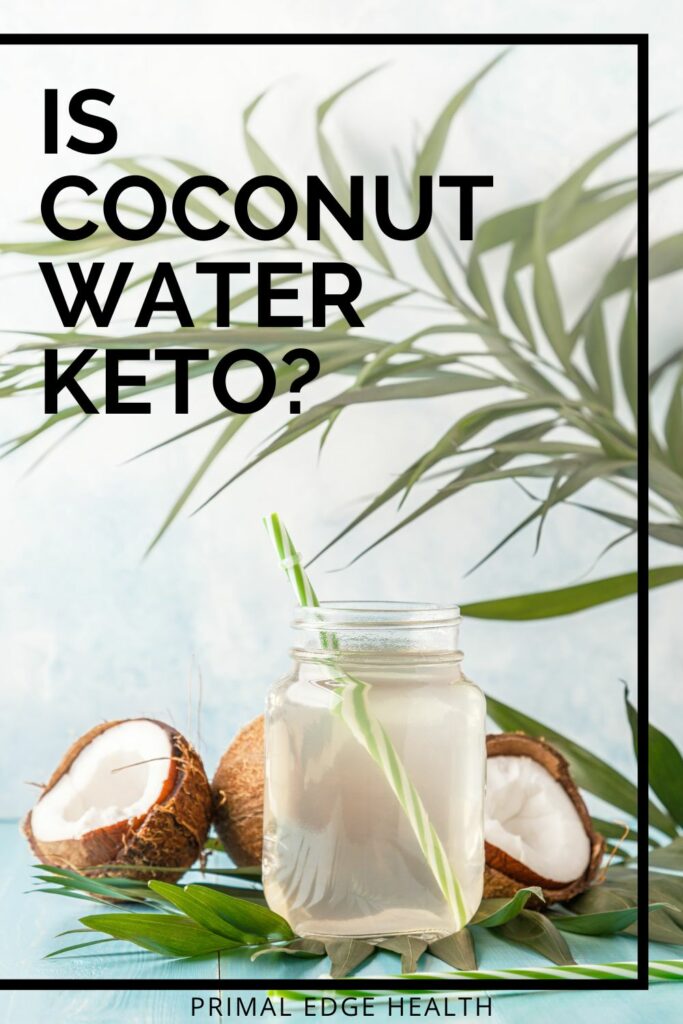
So, is coconut water keto-friendly?
The short answer is no. If you’re regularly consuming coconut water with your keto diet, then you might defeat the purpose of that diet. However, occasional drinking of such water shouldn’t be a problem.
In this article, we’ll examine coconut water and its relationship with the keto diet, so you can make informed choices about hydration and nutrition.
Table of Contents (click to view)
Coconut Water and Keto: What You Need to Know
Ketogenic diets have gained popularity recently for their potential to aid weight loss and improve overall health. The diet involves reducing carbohydrate intake and increasing fat consumption to encourage the body to enter a state of ketosis. In this condition, it burns stored fat for energy instead of glucose from carbohydrates.
One beverage that has been touted as a healthy ingredient for people on a keto and low-carb diet is coconut water. This clear liquid is extracted from young coconuts and has gained a reputation as a natural sports drink due to its high electrolyte content.
However, with its naturally occurring sugars, some may wonder whether the popular drink is keto-friendly or not.
In this article, we will explore the nutritional value of coconut water, its potential impact on ketosis, and whether it can be incorporated into a ketogenic lifestyle. We’ll also look at some keto-friendly alternatives to coconut water and how to make excellent choices regarding hydration on the keto diet.
So, if you’re curious about coconut water and its relationship with the keto diet, read on to learn what you need to know.
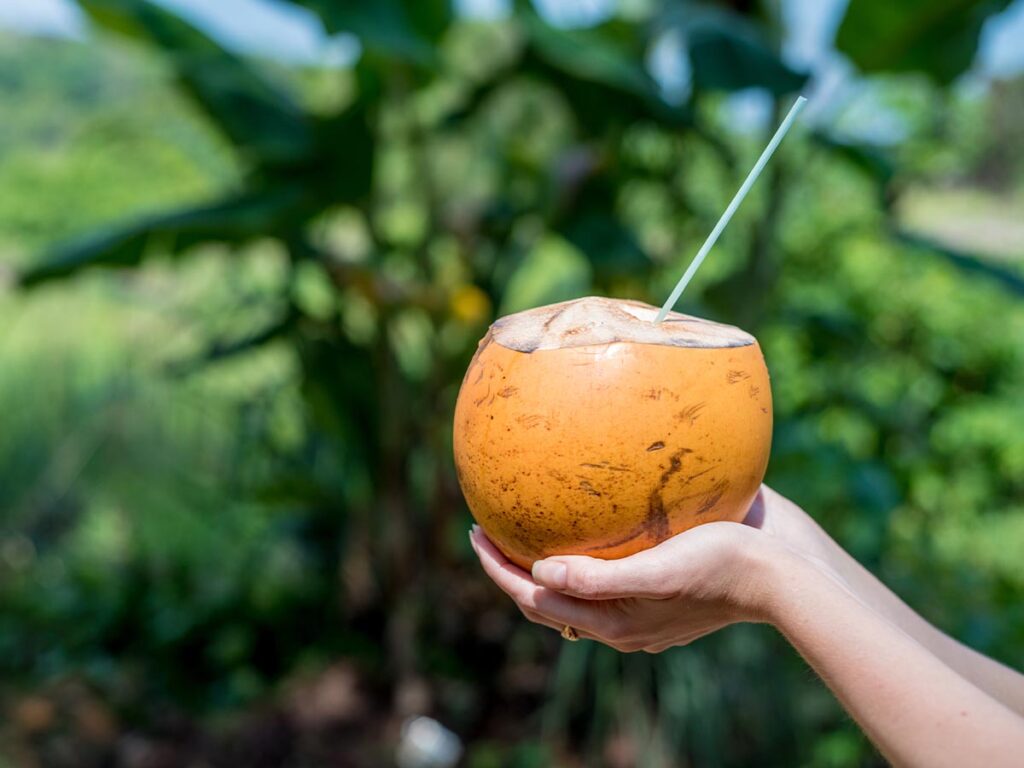
The Basics of Coconut Water: What Is It and How Is It Made?
We can define coconut water as the clear liquid found inside young green coconuts before they mature into the hard brown shells we’re used to seeing.
To extract the water, a hole is typically drilled into the top of the coconut to extract the liquid. Some producers may also use machines for the process.
Pure coconut water is naturally sterile and contains a unique combination of electrolytes, vitamins, minerals, and antioxidants, making it a popular choice for hydration and sports recovery.
It’s also naturally low in fat and calories, making it a potentially healthy choice for those watching their weight or seeking a low-calorie beverage.
The Difference Between Coconut Water and Coconut Milk
While both liquids come from coconuts, they are two distinct liquids with different nutritional profiles and uses.
Coconut milk is made by blending coconut meat with water and straining the mixture to remove any solid pieces. This results in a thick, creamy liquid that is high in calories and fat. Unsweetened coconut milk is often used in a ketogenic diet as a dairy-free alternative to cow’s milk in cooking and baking, or as a creamy addition to smoothies or coffee.
On the other hand, coconut water is the clear liquid found inside green coconuts and is naturally low in calories and fat. It’s often consumed as a refreshing beverage on its own, or used as a base for smoothies or other drinks.
Understanding the Keto Diet: What Makes a Food “Keto-Friendly”?
Foods that are considered “keto-friendly” typically have a few grams of net carbohydrates, which is calculated by subtracting the grams of fiber from the total grams of carbohydrates.
The goal is to stay within a daily carb limit that allows the body to stay in ketosis and burn fat for energy.
In addition to having fewer carbs, keto-friendly foods should also be high in healthy fats, free from added sugars, and preferably unprocessed or minimally processed.
By understanding what makes a food keto-friendly, you can make informed choices about what to eat and drink as a keto dieter.

Sugar in Coconut Water: Does It Affect Your Ketosis?
One of the main concerns about drinking coconut water on the keto diet is its sugar content. Coconut water naturally contains sugar, primarily in the form of glucose and fructose. While these sugars are natural and unrefined, they can still affect your ketosis if consumed in large amounts.
Consuming too much sugar can cause a spike in blood glucose levels, which can kick you out of ketosis and potentially stall your progress.
However, when consumed in moderation, the small amount of sugar in coconut water is unlikely to impact your ketosis significantly.
The key is to monitor your carb count and sugar intake and balance your coconut water consumption with other keto-friendly foods and beverages.
Coconut Water Nutrition Facts: Calories, Carbs, and Sugar Content
Coconut water is often touted as a natural, healthy source of hydration. However, examining its nutritional content is important to see if it fits your dietary goals.
Next time you’re at the store, review the nutrition label of your favorite product and see how it stacks up to ours here.
One single cup (240 ml) of plain, unsweetened coconut water contains approximately:
- 46 calories
- 1 gram of fat
- 9 grams of carbohydrates
- 6 grams of sugar
- 2 grams of protein
As mentioned earlier, coconut water isn’t rich in calories nor has many grams of fat. However, the carb and sugar content shouldn’t be sidetracked. Those six grams of sugar are six grams of net carbs.
Additionally, flavored or sweetened coconut water products can contain significantly more calories and added sugar.
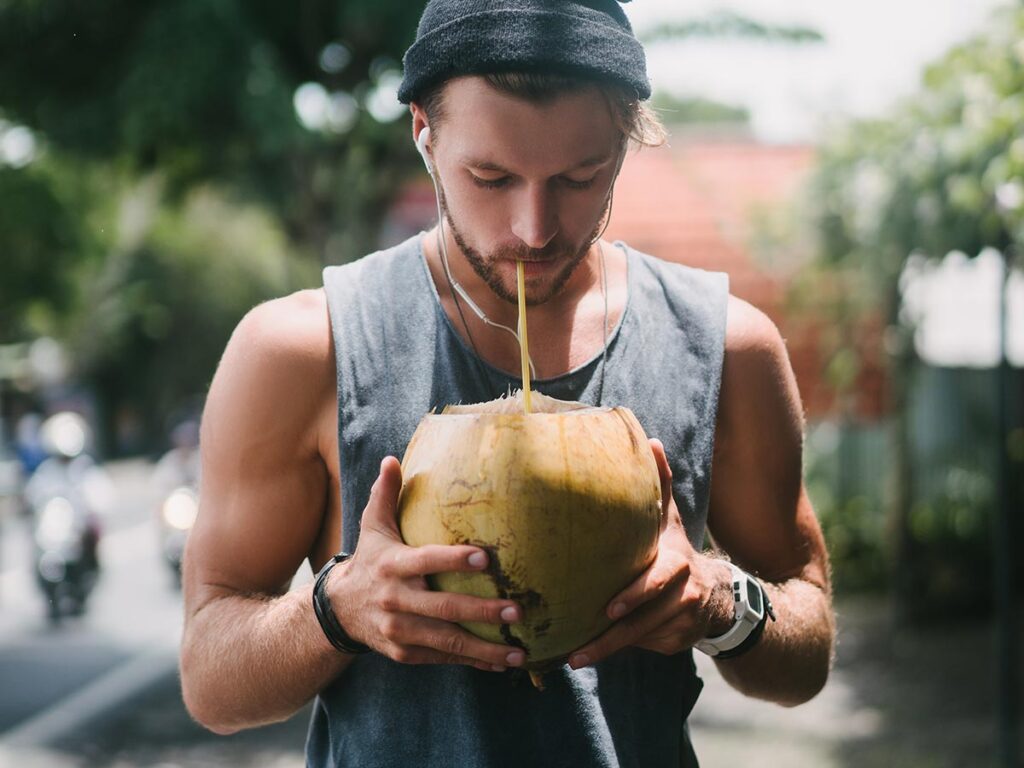
The Pros and Cons of Drinking Coconut Water on a Keto Diet
Drinking coconut water on a keto diet can have both benefits and drawbacks.
Here are some potential pros and cons to consider:
Pros:
- Coconut water is a natural source of hydration and electrolytes, making it a great option for replenishing fluids after exercise or in hot weather.
- Coconut water contains nutrients such as potassium, magnesium, and calcium that can be beneficial for overall health.
- Coconut water is low in calories and fat, making it a good option for limiting calorie intake.
Cons:
- Coconut water is relatively high in carbs and sugar, making them unfeasible in keto diets.
- Flavored or sweetened coconut water products can contain significantly more carbs and sugar than plain, unsweetened coconut water.
- Drinking too much coconut water may exceed your daily carb limit and potentially impact your ketosis.
Drinking coconut water can be a healthy and hydrating option, but monitoring your intake and considering how it fits within your overall keto diet plan is important.
Analyzing the Carb Content of Coconut Water: Can You Drink It on Keto?
While coconut water is a natural and hydrating beverage, it’s important to consider its carb content when following a keto diet.
As previously mentioned, one cup of coconut water contains approximately nine grams of carbs. While this amount may fit within your daily carb limit, it’s important to be mindful of other sources of carbs in your diet.
For example, if you consume multiple cups of coconut water per day, or pair it with high-carb foods or drinks, you may exceed your daily carb limit and compromise your ketosis. Additionally, flavored or sweetened coconut water products can contain significantly more carbs and sugar.
By analyzing the carb content of coconut water and incorporating it in moderation, you can potentially include it in your keto diet. However, generally speaking it’s not worth the effort of being so strict and calculating with macros.
Even though you won’t drink a glass of coconut water regularly, coconut flour, coconut cream, coconut flakes, and coconut oil are all great coconut products to enjoy on a keto diet. In fact, coconut flour is our favorite for baking.

Keto-Friendly Alternatives to Coconut Water: What to Drink Instead
Several options exist if you’re looking for keto-friendly alternatives to coconut water.
Here are some alternatives to try:
- Water – Staying hydrated is key on a keto diet, and plain or lemon water is a calorie-free, carb-free option that can help replenish fluids.
- Electrolyte Supplements – If you’re looking to replenish electrolytes after exercise or in hot weather, electrolyte supplements or powders can be a good option. Look for ones that are low in carbs and sugar.
- Bone Broth – Bone broth is a nutrient-dense option that can be high in electrolytes and beneficial for gut health. Make beef broth at home or buy a high-quality brand online.
- Homemade Keto Lemonade – Using keto-friendly sweeteners like stevia or erythritol and fresh lemon juice, you can make a refreshing and low-carb lemonade perfect for a hot day.
- Sparkling Water – If you’re craving something with a bit of flavor and fizz, sparkling water can be a good option. Look for unsweetened varieties.
- Herbal Teas – Herbal teas, such as peppermint, ginger, or chamomile, can be a hydrating and flavorful option that’s low in carbs and sugar. Serve them hot in the morning or iced as a refreshing drink.
By incorporating these keto-friendly alternatives into your routine, you can stay hydrated and replenish nutrients without compromising your ketosis.
Final Thoughts: Incorporating Coconut Water into Your Keto Lifestyle
In conclusion, while coconut water can have some health benefits, it’s generally too high in carbs to be a practical option for those on a keto diet. Tracking and accounting for the carb content can be mentally taxing and may not be worth the effort.
However, having coconut water occasionally is unlikely to ruin the diet. For long-term success on a keto diet, focus on lower-carb, keto-friendly alternatives and limit coconut water to an occasional indulgence rather than a regular staple.





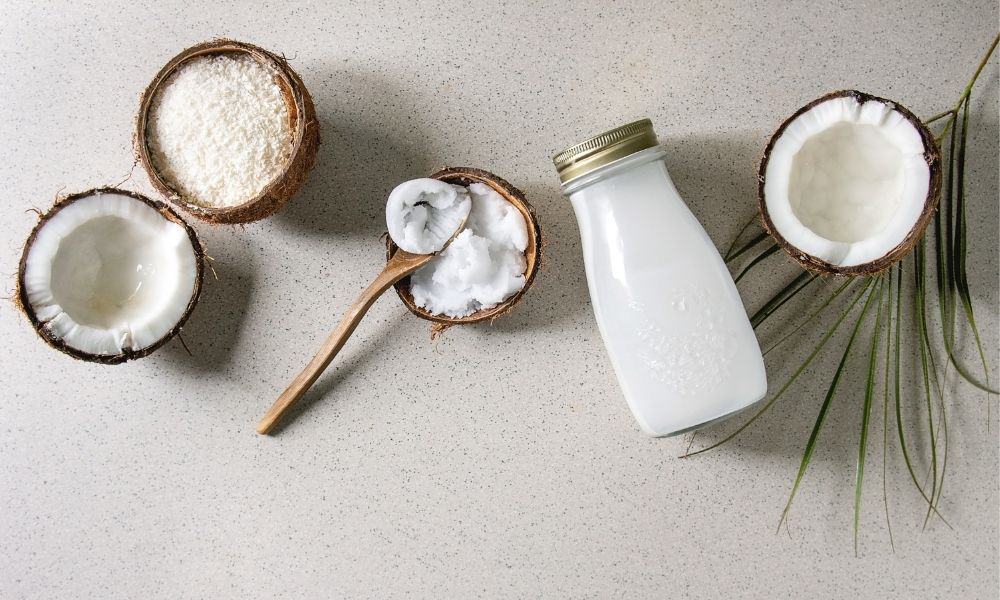
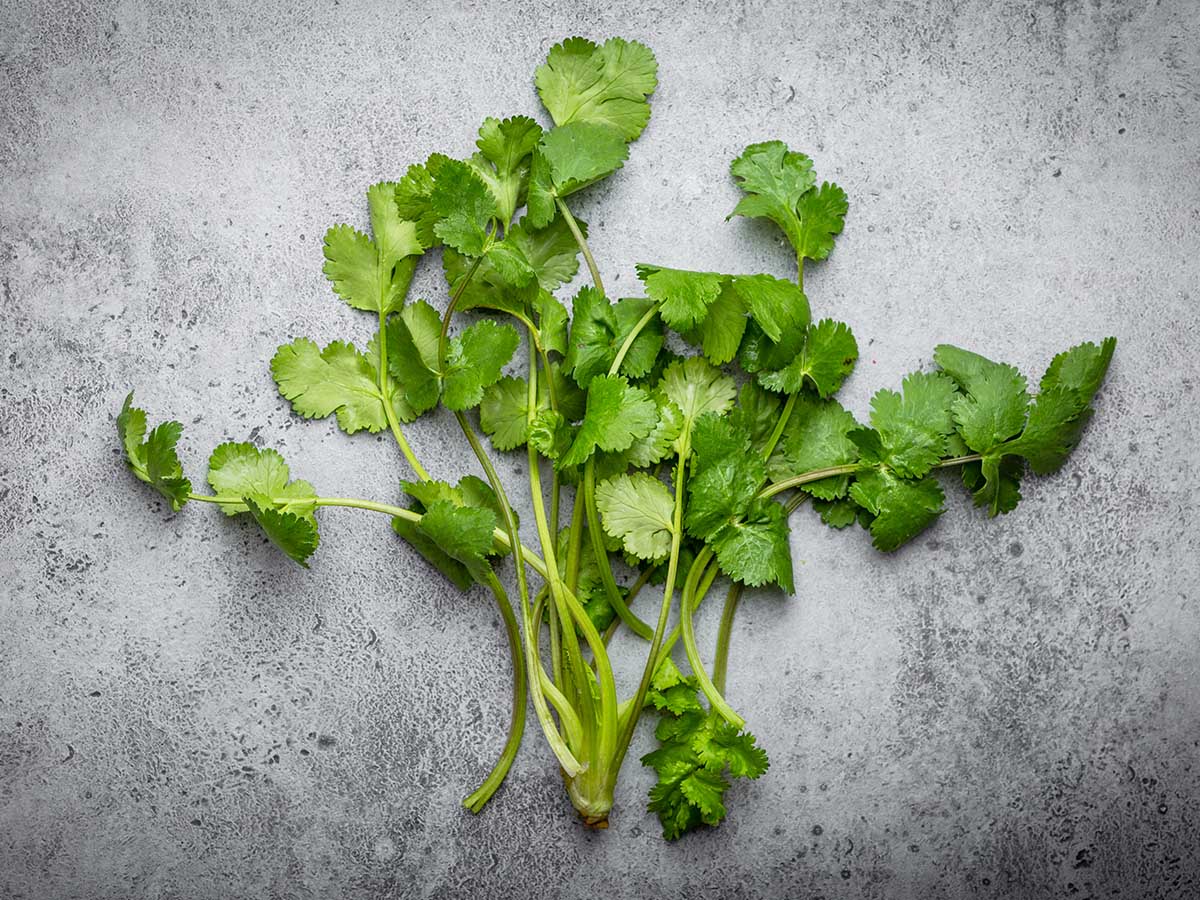

Very informative article. Now I understand why coconut milk is in so many keto recipes, but not coconut water!
I’m happy to clear up that common question, Alisa. Thanks for stopping by and visiting my blog today!